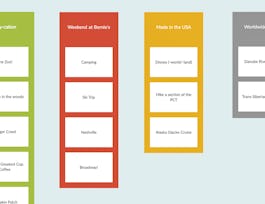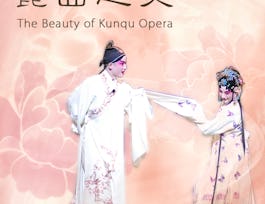This course introduces Korean philosophy projected into the subject of Korean music, especially K-POP, which is drawing global attention today. We confirm that Korea's unique philosophy was the basis for maintaining originality while being universally accepted by many people, and seek the role of philosophy for the continuous development and spread of Korean music.


Korean Music, A Philosophical Exploration
Taught in English
What you'll learn
The students can learn about the various aspects of Korean music and its cultural significance.
The students can understand the differences between K-pop and traditional Korean music (Gugak) and what makes Korean music unique.
The students can learn about the historical and cultural influences on Korean music and how it has evolved over time.
The students can explore the emotional and symbolic meanings of Korean songs and how they relate to Korean culture and identity.
Skills you'll gain
Details to know

Add to your LinkedIn profile
December 2023
7 quizzes
See how employees at top companies are mastering in-demand skills


Earn a career certificate
Add this credential to your LinkedIn profile, resume, or CV
Share it on social media and in your performance review

There are 7 modules in this course
In this week, students will explore the rich and diverse world of Korean music, encompassing both contemporary K-pop and traditional Korean music, known as Gukak. They will gain an appreciation for the connections and continuity between these seemingly disparate genres, recognizing how elements of traditional Korean music influence and inform the contemporary K-pop sound.
What's included
8 videos1 reading1 quiz1 discussion prompt
In this week, students will explore the concept of the "Korean Matrix" and how this course defines cultural boundaries, shedding light on the factors that shape and define Korean culture. Additionally, students will gain insights into the open-mindedness of Koreans towards embracing musical influences from various regions, including India, the Middle East, and China.
What's included
6 videos1 reading1 quiz1 discussion prompt
In this week, students will discover how Koreans have historically embraced foreign musical influences through the Taepyeongso, showcasing their openness to external ideas and sounds. will introduce students to ancient indigenous Korean instruments, specifically the Geomungo and Gayageum, highlighting their unique cultural significance and contributions to Korean music. Lastly, this week will explore the intriguing paradox of Korean culture, where they have demonstrated an acceptance of foreign ideas and music while preserving their own rich traditions.
What's included
5 videos1 reading1 quiz1 discussion prompt
In this week, students will engage with Korean emotions like Han which can be felt through the famous song Arirang and Heung which can be heard in songs like Ong-Heya. Students will learn that Han and Heung are both complementing and contrasting emotions which reflects a unique feature of Korean emotionality.
What's included
6 videos2 readings1 quiz1 discussion prompt
In this week, students will first be introduced to Confucian ritual music and court music, gaining insight into the traditional ceremonial and royal musical practices of Korea.Furthermore, this week will delve into various theories, most notably Mencius’s music theory that explores the intricate relationship between music and morality, shedding light on how music can influence ethical values and behaviors.
What's included
8 videos1 quiz1 discussion prompt
In this week, students will learn about Jeonganbo – Korea's unique musical notation system. Learners will also understand more about the Koreanness in Korean music and the connection between folk music and the Korean language. Additionally, students will be exposed to concepts such as Jangdan and how Daoist music theory might explain Korean musical innovation.
What's included
8 videos1 reading1 quiz1 discussion prompt
This week is a round table with the lecturers and the student research assistants who helped develop this course. In this conversation the students will ask questions about topics ranging from Korean emotions, different models of history, to additional explanation about Jeonganbo (Korean music notation). This conversation serves to both summarize and dig deeper into the contents of the course previously covered.
What's included
1 video1 quiz1 discussion prompt
Instructors


Offered by
Recommended if you're interested in Philosophy

Sungkyunkwan University

Coursera Project Network

The Chinese University of Hong Kong

Erasmus University Rotterdam
Why people choose Coursera for their career





Open new doors with Coursera Plus
Unlimited access to 7,000+ world-class courses, hands-on projects, and job-ready certificate programs - all included in your subscription
Advance your career with an online degree
Earn a degree from world-class universities - 100% online
Join over 3,400 global companies that choose Coursera for Business
Upskill your employees to excel in the digital economy
Frequently asked questions
Access to lectures and assignments depends on your type of enrollment. If you take a course in audit mode, you will be able to see most course materials for free. To access graded assignments and to earn a Certificate, you will need to purchase the Certificate experience, during or after your audit. If you don't see the audit option:
The course may not offer an audit option. You can try a Free Trial instead, or apply for Financial Aid.
The course may offer 'Full Course, No Certificate' instead. This option lets you see all course materials, submit required assessments, and get a final grade. This also means that you will not be able to purchase a Certificate experience.
When you purchase a Certificate you get access to all course materials, including graded assignments. Upon completing the course, your electronic Certificate will be added to your Accomplishments page - from there, you can print your Certificate or add it to your LinkedIn profile. If you only want to read and view the course content, you can audit the course for free.
You will be eligible for a full refund until two weeks after your payment date, or (for courses that have just launched) until two weeks after the first session of the course begins, whichever is later. You cannot receive a refund once you’ve earned a Course Certificate, even if you complete the course within the two-week refund period. See our full refund policy.


